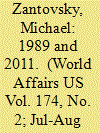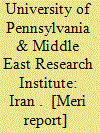| Srl | Item |
| 1 |
ID:
105962


|
|
|
| 2 |
ID:
061818


|
|
|
|
|
| Publication |
London, Croom Helm, 1985.
|
| Description |
181p.pbk
|
| Standard Number |
0709935501
|
|
|
|
|
|
|
|
|
|
|
|
Copies: C:1/I:0,R:0,Q:0
Circulation
| Accession# | Call# | Current Location | Status | Policy | Location |
| 026342 | 955.054/UNI 026342 | Main | On Shelf | General | |
|
|
|
|
| 3 |
ID:
122437


|
|
|
|
|
| Publication |
2013.
|
| Summary/Abstract |
The time it was written the Universal Declaration of Human Rights
(UDHR) was a very appropriate document. Prepared at the aftermath
of the World War II it was a response to the unspeakable harm suffered
by millions immediately before, at the hands of Nazism and
Communism. Both these regimes, in the countries they ruled treated
people inhumanly with tortures and killings at will. To the outside
world their common refrain, if at all, was that it is their internal affair.
The UDHR tried to reject this attitude of dictatorial and totalitarian
regimes. Thus, human rights of everyone were formulated as independent
of the work one does for living or the place one lives in. Human rights
are the rights of everybody in the world because one is human being.
All people, irrespective of the country or political system, are equally
entitled to them. This way the UDHR was a standard narration of what
human rights mean. Adopted by the United Nations in 1948, the thirty
articles of this declaration is a basic text to understand and uphold
human rights.
|
|
|
|
|
|
|
|
|
|
|
|
|
|
|
|
| 4 |
ID:
032587


|
|
|
|
|
| Publication |
New York, Fredenck A Praeses, 1967.
|
| Description |
154p.Hbk
|
|
|
|
|
|
|
|
|
|
|
|
Copies: C:1/I:0,R:0,Q:0
Circulation
| Accession# | Call# | Current Location | Status | Policy | Location |
| 000674 | 943.0879/SCH 000674 | Main | On Shelf | General | |
|
|
|
|
| 5 |
ID:
143747


|
|
|
|
|
| Summary/Abstract |
This article examines Soviet Bloc and Western bugging of their opponents’ diplomatic premises in the early Cold War, from 1945 to the late 1960s. It explains the process of audio surveillance, identifies significant cases of bugging and describes the countermeasures taken by Western states. The paper concludes that the Soviet Union was able to gather a considerable amount of intelligence from bugging Western embassies in Moscow during the early Cold War. In particular, bugging enabled the Soviets to break the diplomatic ciphers of the United States, Britain and West Germany.
|
|
|
|
|
|
|
|
|
|
|
|
|
|
|
|